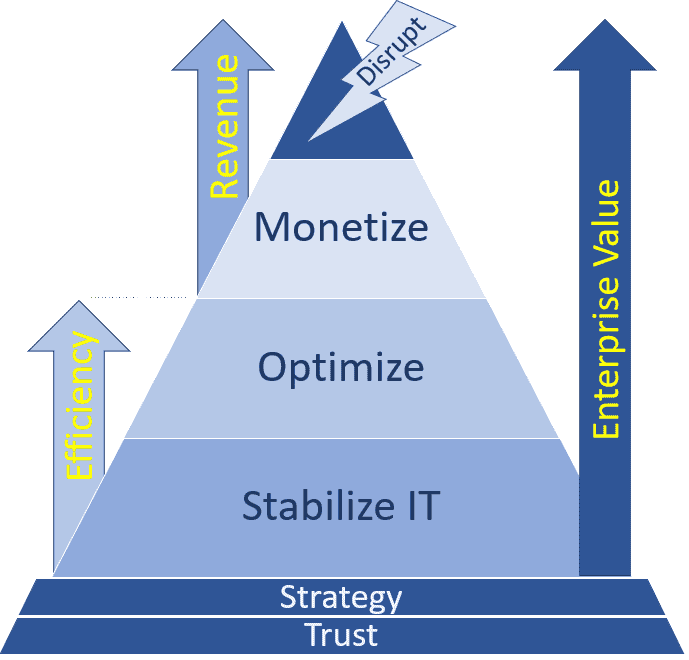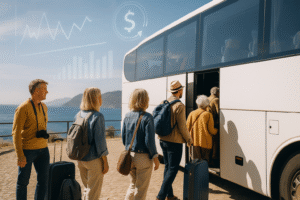Tourism IT & AI Consulting
Proven IT Leaders with Track Records in the Tourism Industry
Tourism IT Experts
Travel and tourism are among the most experience-driven sectors of the economy – where customer expectations rise every year and digital platforms increasingly shape how people plan, book, and enjoy their journeys. From airlines and hotels to cruise lines and tour operators, technology now plays a decisive role in both operational efficiency and guest satisfaction.
Through our flagship Contract CIO+® tech leadership service and our foundational CIO IQ® IT & AI Advisory offering, Innovation Vista provides independent vendor-neutral IT & AI strategy to the Tourism industry. Our consultants combine deep technical skills with firsthand experience guiding IT in hospitality, transportation, and leisure organizations. We understand where broad IT practices apply, and where tourism requires specialized strategies (such as integrating booking systems, ensuring mobile-first customer engagement, and protecting sensitive traveler data).
Unlike firms that rotate in consultants without industry context, our experts have led technology strategy across airlines, resorts, casinos, and more. With Contract CIO+®, our mission extends beyond stabilizing and optimizing IT platforms; it’s about creating seamless digital experiences, strengthening loyalty, and helping travel brands stand out in a crowded marketplace.
State of Innovation in Tourism
Our 2026 Summary of Innovation in the Tourism industry
The Era of “Invisible Service” & Hyper-Personalization
The Tourism industry in 2026 is defined by the removal of friction. Travelers demand a seamless, “invisible” experience where technology handles the logistics, allowing staff to focus purely on hospitality.
Biometrics replace the Front Desk: The physical check-in queue is obsolete. From airports to hotels, biometric identity and mobile keys are the standard. Properties without “straight-to-room” capabilities are seeing measurable drops in guest satisfaction scores (GSS).
The AI Concierge: Generative AI is no longer just a chatbot; it is a predictive itinerary planner. Leading operators use AI to anticipate guest needs—booking spa treatments or dining reservations based on past preferences before the guest even asks.
Reclaiming the Booking: To combat the commission structures of OTAs (Online Travel Agencies), operators are weaponizing data. By leveraging unified guest profiles, brands are offering personalized, exclusive perks that OTAs cannot match, driving a resurgence in high-margin direct bookings.
Eco-Transparency: Sustainability is now a purchase driver. Corporate and leisure travelers alike require real-time carbon footprint data for their trips. Systems that cannot track and report this data are being excluded from lucrative corporate RFPs.
Interested in Leveraging Some of these Tech Capabilities? An Assessment Could Be Step 1.
Is your tech platform and organization ready to scale and advance? Many of our clients choose to start with an IT & AI Assessment and Recommendations report.
This is a high-leverage first step to gain actionable insights from our Tourism consulting team, validate your current IT and AI readiness, and discover how our expert collaboration can drive value for your organization’s future.
TOurism Leaders First - Then Tech Leaders
Our Unique Approach to Tourism Technology
Many consulting firms stop at Stabilizing IT systems, hardening security, and Optimizing infrastructure and budgets. Those steps are important, but in tourism, technology has to do more. It has to delight guests, streamline operations, and keep pace with fast-changing consumer expectations.
With Contract CIO+® and CIO IQ®, we begin by aligning technology strategy with your brand promise and market goals. For a hotel chain, that might mean enabling mobile check-in and personalized guest services. For a cruise line, it could involve integrating reservations, logistics, and onboard experiences into one seamless platform. For a private tour operator, the priority may be automating booking and payments while enhancing digital marketing reach. Each segment of tourism has its own pressures and opportunities, and the IT roadmap must reflect them.
Where we excel is in Monetizing technology. We help clients Innovate Beyond Efficiency® by uncovering ways for IT and data to generate growth – from loyalty platforms that increase repeat bookings, to analytics that optimize pricing, to customer apps that set your experience apart. In tourism, technology is more than a back-office function; it is the front line of guest engagement and a key driver of revenue.
IT & AI Strategy for Your Tourism Niche
Tourism Sectors Covered
- FTC, SEC, SOC audit compliance
- Airlines
- Hotels and hospitality
- Casinos
- Limousine services
- Private tour companies
- Tour buses
- Cruise lines
- Vacation rentals
- Souvenir shops & manufacturing
- Entertainment venues
- Boat rentals and charters
Latest Tourism Tech !nsights from Our Team:
Analytics Maturity in Tourism · Analyzing our Mid-market Survey
Our consultants with experience in Tourism IT & AI consulting, whether in the context of travel agencies, tour operators, attractions, or regional destination managers, know well that these companies face unique pressures. Customer experience is paramount, margins are slim, and demand fluctuates dramatically with seasons and external shocks. Data and analytics – with AI to follow – offer the potential to improve forecasting, personalize offerings, and maximize yield management. Yet the industry’s maturity varies widely: digital-first platforms race ahead, while many mid-market operators remain at the early stages of monetization. The recent update to our Mid-market Analytics Maturity Survey (2023–2025) shows steady progress in stabilization and optimization, with AI adoption gaining traction. Monetization is rising, particularly in larger mid-market firms



